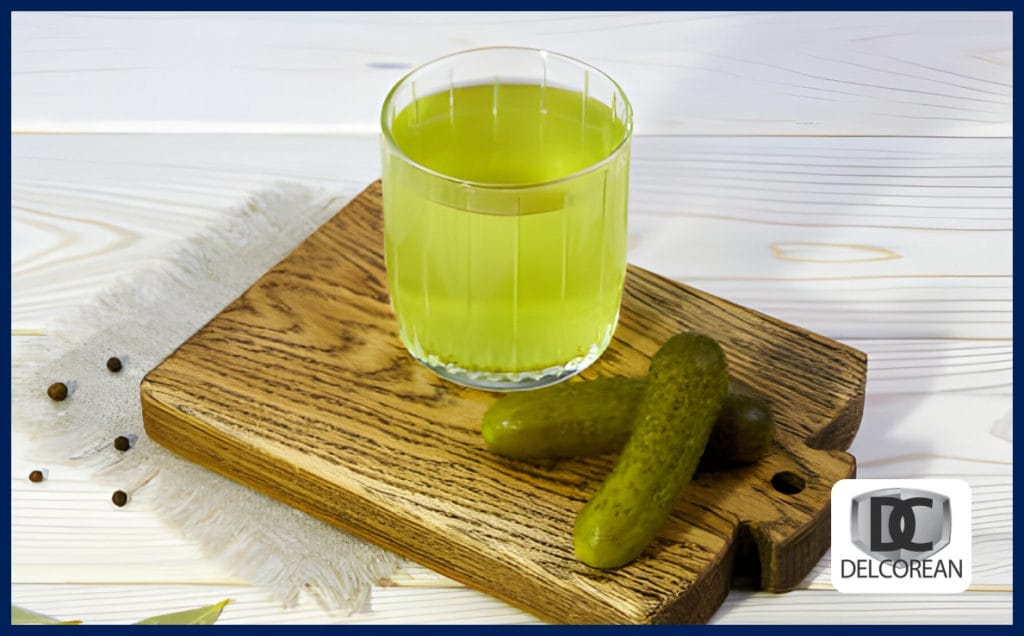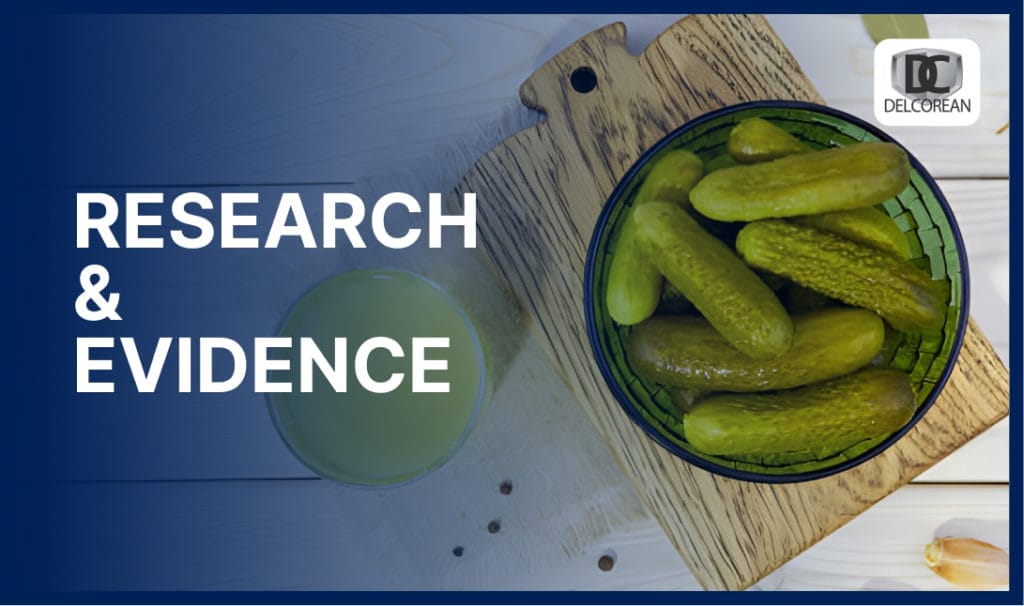Pickle juice has gained popularity as a natural remedy for muscle cramps, offering an unexpected yet effective solution for many. This article explores the science behind why pickle juice might be your go-to for cramp relief, exploring its benefits, usage, and potential mechanisms at play.
Whether you’re an athlete looking to optimize performance or someone seeking alternatives to traditional remedies, you’ll find valuable insights here. Read on to learn more.

How Does Pickle Juice Help Cramps?
Pickle juice, often seen as a byproduct of pickling cucumbers, has garnered attention for its potential benefits in alleviating muscle cramps. This section explores the components of pickle juice and the scientific theories that support its effectiveness in cramp relief.
Electrolytes and Hydration
One of the primary reasons pickle juice is considered beneficial for cramps is its high electrolyte content. Electrolytes, including sodium and potassium, play a crucial role in maintaining fluid balance, nerve function, and muscle contraction. When you sweat during intense physical activity, you lose these vital electrolytes, which can lead to dehydration and muscle cramps.
Pickle juice contains a significant amount of sodium, essential for rehydration. Sodium can help retain water in the body and maintain the balance of fluids inside and outside of cells. This is particularly important for athletes or individuals engaged in strenuous activities, as replenishing lost sodium can help prevent cramps and quicken recovery.
Potassium, another key electrolyte found in pickle juice, assists in muscle function and helps prevent cramping by maintaining proper muscle contraction and relaxation. The balance between sodium and potassium is crucial for optimal muscle health and function, making pickle juice a simple yet effective remedy for preventing and treating muscle cramps.
Vinegar Content
Another theory behind the effectiveness of pickle juice in combating muscle cramps focuses on the vinegar content. Vinegar, primarily acetic acid, is believed to help alleviate cramps by replenishing electrolytes and triggering muscle reflexes. When consumed, the sour taste of vinegar may stimulate nerve receptors in the throat and mouth, which could signal the muscles to stop cramping.
This reflex mechanism, known as the “neural reflex hypothesis,” could support the idea that acetic acid in vinegar might help short-circuit neurons misfiring in cramped muscles.

Research and Evidence
The debate over pickle juice’s efficacy in treating muscle cramps is ongoing, with reports and scientific studies contributing to the discussion.
Reviewing the Research
Several studies have aimed to unravel the mystery of pickle juice’s effectiveness against muscle cramps. One notable study published in the Journal of Athletic Training found that pickle juice could alleviate cramp symptoms significantly faster than drinking no fluids at all. The participants, who were induced with mild dehydration and subsequent muscle cramps, experienced relief within 35 seconds of consuming pickle juice, suggesting an effect beyond mere hydration.
Another research angle investigates the role of vinegar in pickle juice, proposing that it might trigger reflexes to relax muscles through the neural reflex hypothesis. However, these studies often conclude with recommendations for further research, indicating that while there are positive indications of pickle juice’s effectiveness, the exact mechanisms and reliability of these outcomes require more studies for them to be fully understood.
Unreliable Evidence vs. Scientific Skepticism
On the anecdotal front, countless individuals, especially within athletic communities, report rapid relief from cramps after consuming pickle juice, often describing it as a ‘miracle cure’ during sports events and intense workouts.
These personal accounts contradict the scientific community’s call for caution due to the limited scale and scope of scientific studies.
The skepticism from some healthcare professionals and scientists stems from concerns about generalizing the results of small or less comprehensive studies. They emphasize the need for larger-scale controlled trials to validate pickle juice’s efficacy, understand its action mechanisms, and ensure its safety across diverse populations.
While anecdotal evidence highlights immediate relief, it does not account for placebo effects or other variables like overall hydration status, electrolyte balance, and individual health conditions, which can all influence muscle cramp experiences and outcomes.
So, Does Pickle Juice Actually Help Cramps?
Yes, pickle juice is good for cramps. It contains high levels of electrolytes such as sodium and potassium, essential for hydration and muscle function, helping to alleviate muscle cramps quickly.
Additionally, the vinegar in pickle juice may trigger reflexes that relax muscles, providing rapid relief from cramps.

How to Use Pickle Juice for Cramps
Turning to pickle juice as a remedy for muscle cramps requires understanding the best practices in terms of dosage, timing, and method of consumption to maximize its potential benefits while minimizing any risks. When using pickle juice for cramps, the following factors must be considered:
- Recommended Dosage: For immediate relief, a common recommendation is to consume about 1 to 2 ounces (approximately 30 to 60 milliliters) of pickle juice at the first sign of a cramp. If using pickle juice as a preventative measure, such as before engaging in exercise or activities known to induce cramps, the same small dose can be consumed.
- Method: Pickle juice can be consumed straight from the jar, but dilution is an option for those who find the taste too strong or are concerned about the sodium content. Mixing pickle juice with water can make it more palatable and reduce sodium intake per serving. However, diluting it may also diminish its effectiveness for cramp relief, so this approach requires some experimentation to find the right balance for individual needs. In addition to direct consumption, some individuals incorporate pickle juice into their diet in other ways, such as using it in salad dressings or marinades.
Precautions and Considerations
While pickle juice can be a quick fix for muscle cramps for many, it’s crucial to understand when its use is appropriate and to be aware of potential side effects. This awareness ensures that individuals can make informed decisions about using pickle juice as a remedy.
When to Use Pickle Juice
Pickle juice may be considered for immediate relief of muscle cramps, particularly those associated with physical activity, dehydration, or electrolyte imbalances. It’s most appropriate for sudden, acute muscle cramps where rapid relief is desired.
However, it’s essential to recognize situations where medical advice is necessary. If cramps are severe, recurrent, or don’t respond to home remedies like pickle juice, it could indicate underlying health issues such as nutritional deficiencies, nerve dysfunction, or circulation problems. Cramps accompanied by swelling, redness, or skin changes should also prompt a consultation with a healthcare professional to rule out more serious conditions.
Moreover, individuals with certain health conditions, especially those related to kidney function, heart disease, or high blood pressure, should consult a healthcare provider before using pickle juice due to its high sodium content. The same applies to anyone on a sodium-restricted diet.
Potential Side Effects
While pickle juice can offer quick relief for cramps, consuming it in large quantities or too frequently can lead to side effects, primarily due to its high sodium content. Excessive sodium intake can contribute to hypertension (high blood pressure), increased risk of heart disease, and kidney strain, particularly in individuals sensitive to salt or with pre-existing health conditions.
Besides the high sodium levels, the acidic nature of pickle juice can also lead to gastrointestinal discomfort for some people, including heartburn, stomach pain, or indigestion, especially when consumed on an empty stomach.
Get Rid of Your Muscle Cramps Today
Pickle juice has emerged as a popular and intriguing remedy for muscle cramps, offering a natural and accessible option for many seeking relief. Its potential benefits, rooted in electrolyte replenishment and the unique properties of vinegar, make it worth considering for those afflicted by sudden muscle cramps.
By combining the targeted use of pickle juice with preventive measures, such as Delcorean’s Cramp 911 cream, individuals can create a well-rounded approach to managing muscle cramps.


